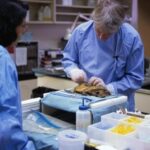Ever find yourself pondering the macabre, drawn to the intersection of medicine and mystery? Perhaps the question isn’t whether you *should* be fascinated by forensic pathology, but rather, what insidious spark ignited that flame within you? The path to becoming a forensic pathologist is rarely straightforward, often paved with peculiar proclivities and an unwavering curiosity about the ultimate enigma: death.
One might hypothesize that the initial fascination stems from a childhood exposure to detective fiction. Who among us hasn’t devoured Sherlock Holmes, captivated by his deductions based on minute observations of the deceased? These literary explorations often lay the groundwork, introducing the concept of extracting truth from the silent narratives etched upon a cadaver. This initial spark, fueled by fictional accounts, can transition into a more grounded interest as one matures.
The influence of popular culture cannot be discounted. Television shows like “Quincy, M.E.” and “CSI” have undoubtedly played a role in demystifying the profession, albeit with a healthy dose of Hollywood embellishment. While these depictions often veer into the sensational, they do highlight the critical role forensic pathologists play in unraveling criminal investigations. The allure of solving puzzles, of bringing closure to grieving families, is a powerful motivator.
However, the transition from casual interest to dedicated pursuit often involves a pivotal moment. For some, it might be a captivating biology class in high school, where the intricate workings of the human body are revealed in all their glory – and vulnerability. The realization that disease processes and traumatic injuries leave discernible marks on the body can be profoundly impactful. The ability to understand these marks, to decipher their meaning, can feel like unlocking a secret language.
Further fueling this burgeoning interest may be undergraduate studies in pre-med, biology, or chemistry, providing a solid foundation in scientific principles. The rigor of these courses, coupled with exposure to research methodologies, fosters the analytical thinking crucial for forensic pathology. Students are introduced to the scientific method, learning to formulate hypotheses, design experiments, and interpret data with objectivity. This analytical framework is essential for evaluating evidence and drawing sound conclusions in forensic investigations.
Then, there is medical school, a crucible where aspiring physicians are exposed to the full spectrum of human illness and injury. It is during medical school that many individuals encounter the field of pathology, observing firsthand the diagnostic power of microscopic examination and autopsy. The opportunity to participate in autopsies, to witness the anatomical manifestations of disease and trauma, can be a transformative experience. The tactile reality of death, coupled with the intellectual challenge of determining the cause, can solidify one’s resolve to pursue forensic pathology.
But the path doesn’t end there. Following medical school, a residency in pathology is required, providing specialized training in the techniques of autopsy and microscopic examination. This is where the aspiring forensic pathologist truly hones their skills, learning to distinguish between natural and unnatural causes of death. They delve into the intricacies of toxicology, learning how drugs and poisons interact with the human body. They study the patterns of injury caused by blunt force trauma, sharp force trauma, and firearms.
And, of course, the mentorship of experienced forensic pathologists plays a critical role. Learning from seasoned professionals, observing their approach to complex cases, and receiving guidance on the nuances of death investigation is invaluable. These mentors impart not only technical skills but also ethical considerations, emphasizing the importance of objectivity, integrity, and a commitment to justice.
For some, a background in law enforcement or criminal justice may serve as a precursor. The desire to contribute to the pursuit of justice, to use scientific knowledge to solve crimes, can be a powerful driving force. Individuals with this background often possess a unique perspective, understanding the legal framework within which forensic pathology operates and appreciating the impact of their findings on criminal proceedings.
Finally, the inherent intellectual challenge of forensic pathology is a major draw for many. The field demands a constant pursuit of knowledge, a willingness to stay abreast of the latest advances in medicine, toxicology, and criminalistics. Each case presents a unique puzzle, requiring the pathologist to piece together disparate pieces of evidence, to reconcile conflicting findings, and to arrive at a scientifically defensible conclusion. The satisfaction of solving these puzzles, of bringing clarity to ambiguous circumstances, is a reward in itself.
So, what ignites the spark? There is no single answer. For some, it’s the allure of the unknown, the challenge of unraveling the mysteries of death. For others, it’s the desire to contribute to justice, to speak for those who can no longer speak for themselves. And for still others, it’s the sheer intellectual stimulation of a field that constantly demands growth and adaptation. Ultimately, the journey into forensic pathology is a personal one, driven by a unique combination of curiosity, compassion, and a profound respect for the fragility of human life.










Leave a Comment